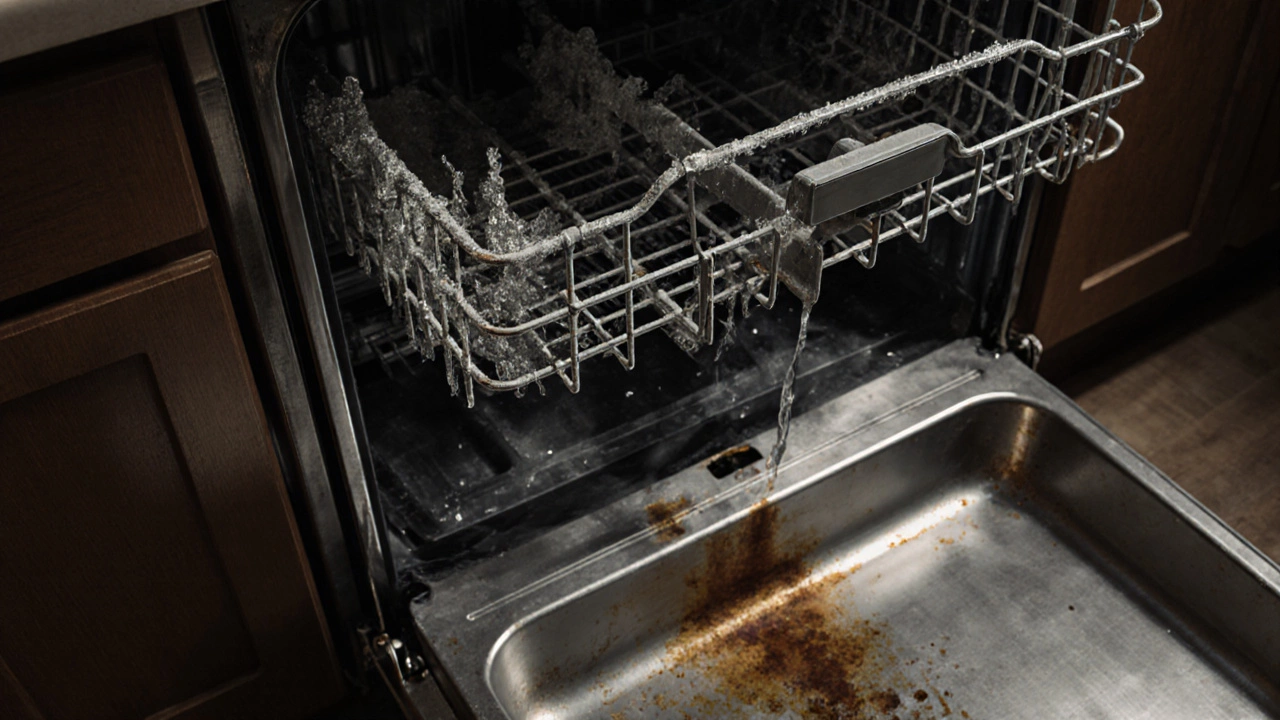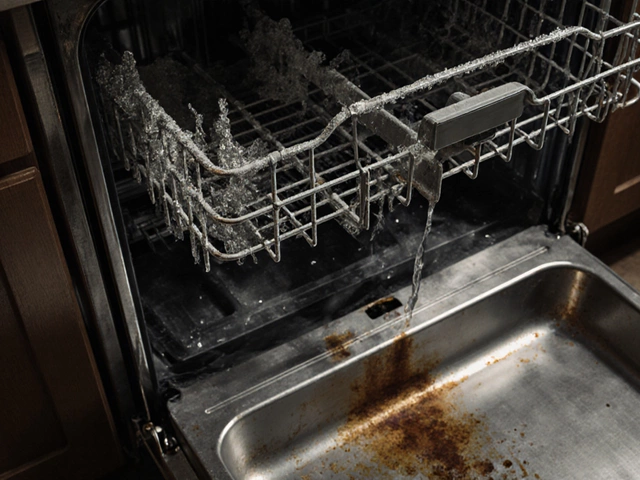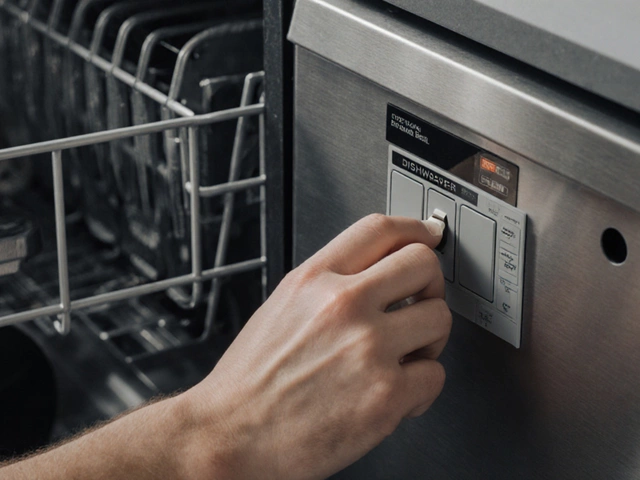Dishwasher Lifespan Calculator
Dishwasher Health Check
Get a personalized recommendation based on your dishwasher's age and current issues.
Recommendation
Repair Cost:
Replacement Cost:
Most people don’t think about their dishwasher until it stops working. Then they’re stuck with dirty dishes, a messy kitchen, and a big decision: fix it or buy new? The truth is, dishwashers don’t last forever - but they also don’t die after three years. Knowing what a good lifespan looks like helps you avoid wasting money on repairs or replacing a machine that still has years left.
How Long Should a Dishwasher Last?
A typical dishwasher lasts between 9 and 12 years. That’s the average you’ll see from brands like Bosch, Whirlpool, GE, and Samsung when they’re properly maintained. Some last longer - up to 15 years - if they’re treated well. Others give out before 7 years if they’re cheaply made, heavily used, or exposed to hard water.
There’s no magic number, but here’s what actually matters: if your dishwasher is older than 10 years and you’re starting to see problems, it’s time to pay attention. Repairs at that age often cost more than the value of the machine. A $300 repair on a 12-year-old dishwasher doesn’t make financial sense when you can buy a new one for $500-$800 with better efficiency and features.
What Drives Dishwasher Lifespan?
Not all dishwashers are built the same. A $400 model from a discount store won’t last as long as a $1,200 premium unit. But even the best dishwasher won’t survive if you ignore basic care.
- Water quality - Hard water builds up mineral deposits that clog spray arms, damage heating elements, and ruin seals. If you live in an area with hard water, using a dishwasher salt or filter makes a big difference.
- Usage frequency - A family that runs the dishwasher every day wears it out faster than someone who uses it 3-4 times a week. Heavy use can shorten lifespan by 2-4 years.
- Maintenance habits - Cleaning the filter monthly, wiping down the door seal, and running a vinegar cycle every few months can add years to its life.
- Brand and build quality - Bosch and Miele dishwashers are known for lasting longer because they use higher-grade motors, stainless steel tubs, and better pump systems. Cheaper models often use plastic parts that crack or warp over time.
One study from the National Association of Home Builders found that dishwashers with stainless steel interiors lasted an average of 11.5 years, while plastic tub models averaged just 8.7 years. That’s a nearly 3-year difference just from one material choice.
Signs Your Dishwasher Is Reaching the End
You don’t need to wait for it to stop working completely to know it’s time to replace it. Watch for these red flags:
- Dishes come out dirty or spotty - If cleaning performance drops even after cleaning the filter and checking spray arms, the pump or heating element may be failing.
- Unusual noises - Grinding, clanking, or loud humming often means the motor or impeller is wearing out. These parts are expensive to replace.
- Water leaks - Minor leaks around the door seal can be fixed. But if water pools under the unit or leaks from the bottom, it’s likely a cracked tub or failing pump - both costly repairs.
- Door won’t latch properly - A broken latch might seem minor, but it often means the control board or door mechanism is failing. Replacing these parts rarely pays off in older units.
- Energy bills are rising - Older dishwashers use 6-10 gallons of water per cycle. New ENERGY STAR models use 3-4 gallons. If your bill has gone up and your dishes aren’t getting cleaner, efficiency loss is a sign.
If you’re dealing with two or more of these issues and your dishwasher is over 8 years old, replacement is usually the smarter move.
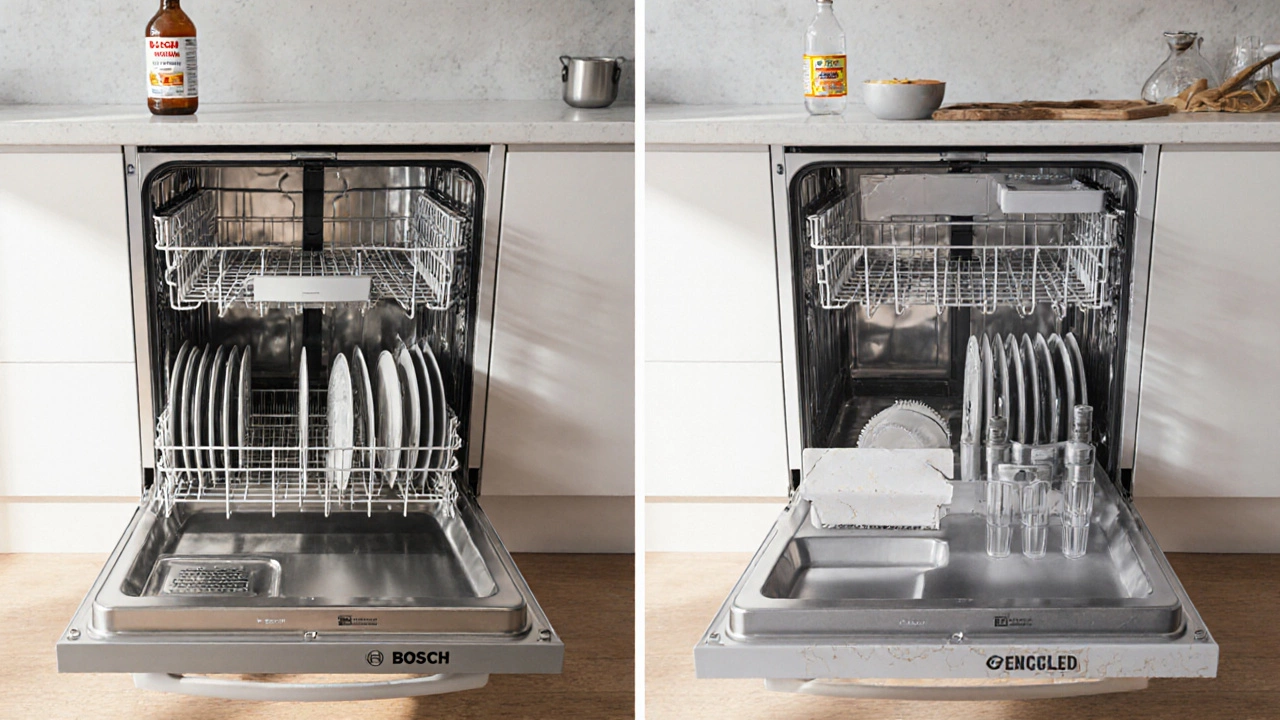
When Is Repair Worth It?
Not every problem means a new dishwasher. Some fixes are cheap and effective:
- Replacing the door gasket - Costs $20-$40. Takes 30 minutes. Fixes leaks and improves cleaning.
- Cleaning or replacing the filter - Most models have a removable filter. Clogs here cause poor cleaning. Cleaning it monthly prevents bigger issues.
- Fixing the spray arm - If it’s clogged with food debris, soak it in vinegar. If it’s cracked or broken, replacement parts cost under $30.
- Resetting the control board - Sometimes the dishwasher just needs a power cycle. Unplug it for 5 minutes, then plug it back in.
But avoid spending more than $150-$200 on repairs for a dishwasher older than 8 years. The labor alone often costs $75-$125 per hour. If the part costs $100 and the tech charges $100, you’ve spent $200 to keep a 9-year-old machine running. That’s close to the price of a new entry-level model.
How to Get the Most Out of Your Dishwasher
Want to stretch your dishwasher’s life? Do this:
- Scrape, don’t rinse - Pre-rinsing wastes water and doesn’t help cleaning. Modern dishwashers are designed to handle food scraps. Just scrape off big bits.
- Use the right detergent - Pods work well, but avoid gel if you have hard water. It leaves residue. Powder or tablets with built-in rinse aid are better.
- Run hot water before starting - This ensures the first cycle gets hot water right away. Cold starts strain the heating element.
- Clean the interior monthly - Run an empty cycle with a cup of white vinegar on the bottom rack. It removes grease, odor, and mineral buildup.
- Check the spray arms yearly - Remove them and rinse out the holes. Use a toothpick to clear any blockages.
These small habits can easily add 3-5 years to your dishwasher’s life - and save you hundreds in repairs or replacements.
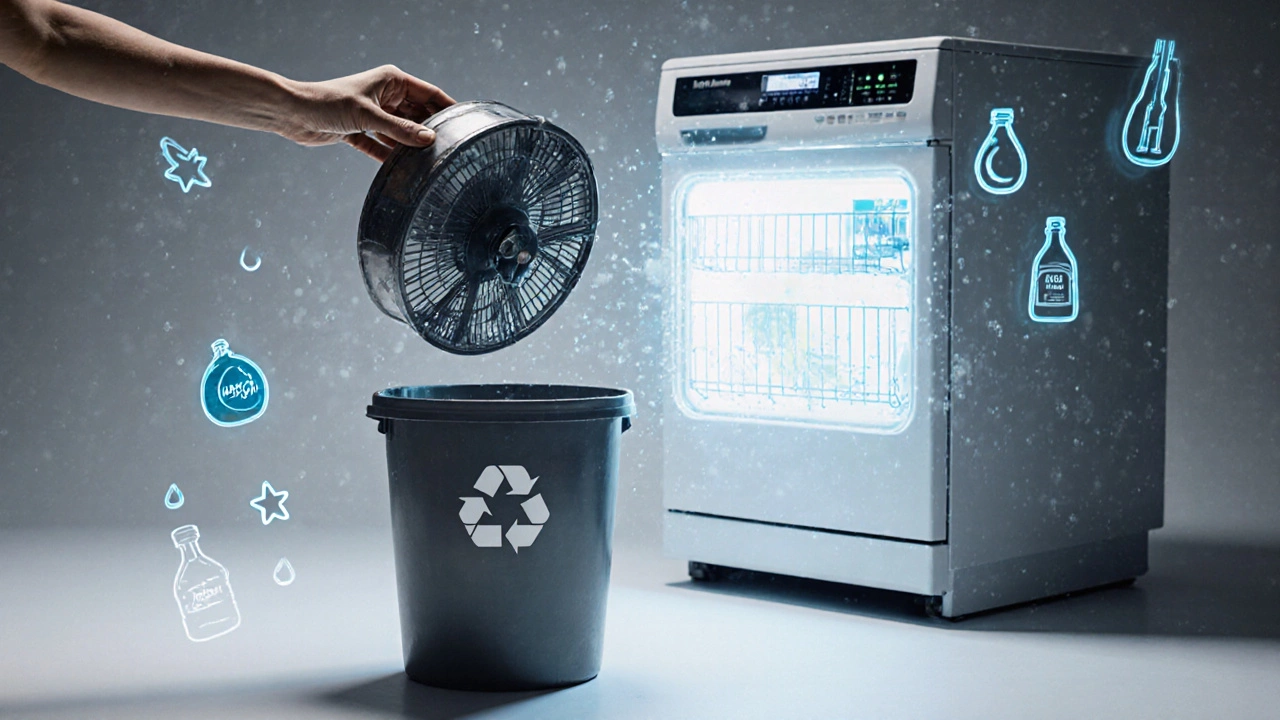
Dishwasher Replacement Guide
If you’re ready to replace your dishwasher, here’s what to look for:
| Feature | Good Option | Avoid |
|---|---|---|
| Tub material | Stainless steel | Plastic |
| Energy rating | ENERGY STAR certified | Older non-certified models |
| Noise level | 45 dB or lower | Over 50 dB |
| Wash cycles | At least 4 (including heavy, eco, and quick) | Only 1-2 basic cycles |
| Adjustable racks | Yes - especially third rack | Fixed racks |
For most households, a mid-range model between $600 and $800 offers the best balance of durability, features, and efficiency. Brands like Bosch, LG, and KitchenAid consistently rank highest in consumer satisfaction and longevity.
What Happens to Old Dishwashers?
Don’t just throw yours out. Most cities have appliance recycling programs. Some retailers even haul away your old unit when they deliver the new one. Recycling ensures the steel, copper, and plastic get reused - and keeps hazardous materials like refrigerants out of landfills.
If your dishwasher still works but is outdated, consider donating it to a local charity or housing nonprofit. Many families need reliable appliances and can’t afford new ones.
Is it worth repairing a 10-year-old dishwasher?
Generally, no. By 10 years, most dishwashers are past their peak efficiency and reliability. Repairs cost more than 50% of a new unit’s price, and the risk of another failure soon after is high. Unless it’s a high-end model with a stainless steel tub and you’re only fixing a simple part like a spray arm or gasket, replacement is the better choice.
Can hard water ruin a dishwasher?
Yes. Hard water leaves mineral deposits that clog spray arms, coat heating elements, and degrade rubber seals. Over time, this leads to poor cleaning, longer cycles, and mechanical failure. Using dishwasher salt or installing a water softener can extend your dishwasher’s life by several years.
How often should I clean my dishwasher filter?
Clean it at least once a month. If you run the dishwasher daily or have hard water, clean it every two weeks. A clogged filter is the #1 cause of poor cleaning performance and can strain the pump, leading to premature failure.
Do more expensive dishwashers last longer?
Not always, but usually. Premium models use better materials - stainless steel tubs, quieter motors, and more durable pumps. They’re also built with tighter quality control. A $1,000 Bosch often lasts 14+ years, while a $400 budget model might struggle past 7. The difference is in build quality, not just brand name.
Should I replace my dishwasher before it breaks?
If it’s over 10 years old and you’re noticing performance drops - louder operation, longer cycles, or spotty dishes - it’s smart to replace it before it fails completely. New models save water and electricity, and you’ll avoid the stress of a sudden breakdown during a busy week.
Final Thought: Think Long-Term, Not Short-Term
A dishwasher isn’t a disposable item. It’s one of the most-used appliances in your home. Spending a little time on maintenance saves you money and hassle down the road. And when it’s time to replace it, don’t chase the lowest price - choose durability and efficiency. A $700 dishwasher that lasts 12 years costs less per year than a $400 one that dies in 6.
Keep your dishwasher clean. Watch for signs of wear. Replace it at the right time. That’s how you avoid surprise repairs and keep your kitchen running smoothly for years to come.

